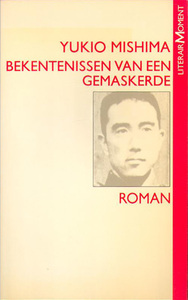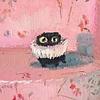Take a photo of a barcode or cover
-loved all the parts about st. sebastian, the gory fantasy of the narrator
-i relate to povs of gay men about sexuality;; maybe it's the quantity, maybe it's the self loathing, maybe it's the painful introspection
-misogyny that's very typical of novels from this time period and style (kind of like giovanni's room)
-i feel like lots of interwoven freud/jung stuff? creepy but i enjoyed it
-sad and hopeless but somehow not depressing
-definitely one of the top books of my life so far,,, im gonna have to read this again bc i chugged it now i gotta chew it
-i relate to povs of gay men about sexuality;; maybe it's the quantity, maybe it's the self loathing, maybe it's the painful introspection
-misogyny that's very typical of novels from this time period and style (kind of like giovanni's room)
-i feel like lots of interwoven freud/jung stuff? creepy but i enjoyed it
-sad and hopeless but somehow not depressing
-definitely one of the top books of my life so far,,, im gonna have to read this again bc i chugged it now i gotta chew it
Pfuà. Es mereix totes les estrelles, i algun planeta també. Impressionant.
El protagonista, l'alter ego de l'autor, recorda diferents episodis de la seva vida en què ha anat descobrint la seva sexualitat, la seva homosexualitat. Des d'un portador d'excrements que va veure als 4 anys passant per un quadre de Sant Sebastià i a companys d'institut. També es veu els seus intents per dissimular la seva orientació sexual, intentant tenir una relació sentimental amb la Sonoko.
El llibre també serveix per veure una mica Japó durant la Segona Guerra Mundial: les sirenes d'avís de bombarejos, la tensió per si et reclutaran i t'enviaran al front, la convicció que moriràs amb 20 anys (convicció que, sembla, l'autor també tenia), i com la vida segueix malgrat tot.
Recomanadíssim.
El protagonista, l'alter ego de l'autor, recorda diferents episodis de la seva vida en què ha anat descobrint la seva sexualitat, la seva homosexualitat. Des d'un portador d'excrements que va veure als 4 anys passant per un quadre de Sant Sebastià i a companys d'institut. També es veu els seus intents per dissimular la seva orientació sexual, intentant tenir una relació sentimental amb la Sonoko.
El llibre també serveix per veure una mica Japó durant la Segona Guerra Mundial: les sirenes d'avís de bombarejos, la tensió per si et reclutaran i t'enviaran al front, la convicció que moriràs amb 20 anys (convicció que, sembla, l'autor també tenia), i com la vida segueix malgrat tot.
Recomanadíssim.
Hard to believe this was published in 1949 and Mishima was only 24. I wonder how it woud have differed had he written this, say, two decades later. Would it have been just as candid?
Also, people have called this pretentious and while I agree maybe a tiny bit (I really don't think it was that bad and was actually surprised by its relative directness) is it really that much more pretentious than any of his later work? ;-)
Also, people have called this pretentious and while I agree maybe a tiny bit (I really don't think it was that bad and was actually surprised by its relative directness) is it really that much more pretentious than any of his later work? ;-)
dark
reflective
sad
medium-paced
Plot or Character Driven:
Character
Strong character development:
Complicated
Loveable characters:
Complicated
Flaws of characters a main focus:
Yes
challenging
dark
emotional
reflective
slow-paced
Plot or Character Driven:
Character
Strong character development:
Complicated
Loveable characters:
Complicated
Diverse cast of characters:
No
Flaws of characters a main focus:
Yes
challenging
dark
reflective
slow-paced
Plot or Character Driven:
Character
Strong character development:
No
Loveable characters:
No
Diverse cast of characters:
No
Flaws of characters a main focus:
Complicated
I think I just found a new favorite author! I'm obsessed! I've been on a roll lately, discovering five-star read after five-star read. With this classic novel translated from Japanese I got the bonus of being introduced to one of the most fascinating and enigmatic artists to ever live: Yukio Mishima. That's not just hyperbole. I enjoyed researching the author on YouTube just as much as I loved every gorgeous page of his writing. What a singular and impressive human being. I'm ashamed and honestly a bit disturbed that I'd never heard of this man who I now consider to be one of my favorite and most intriguing literary figures. Confessions of a Mask was the short novel that would propel Mishima to international fame. It's amazing to me that it was published in Japanese in 1949 (when the author was in his early twenties) and in English in 1958 because it contains such a controversial semi-autobiographical confession that was unspeakable at the time; that the main character is secretly a homosexual man. In the days surrounding the second World War, our protagonist Kochan struggles to accept his own identity and attempts desperately to hide his feelings behind a masculine, hetero mask. We follow his life-long journey from his childhood as a conflicted and confused little boy. From boyish crushes to very adult confrontations with his sexuality, Kochan explores and explains his identity crisis with unfiltered honesty and intensely intimate thoughts of complex inner conflict. The main relationship here is not a traditional romance but an ill-fated and heartbreaking last attempt at conforming to societal pressures with a beautiful young girl named Sonoko. It's an all-too-common right of passage that exemplifies the queer struggle to be accepted by the world, their families and even themselves. I'm thrilled that I related so much to these words written over half a century ago in another language and halfway around the world. Mishima is insightful, funny and frightening in his poetic prose and his raw, brutally honest confessions. His novel is surprisingly accessible, fresh, and profound. His use of close first-person narration is one of the best I've ever read and should be studied by all aspiring writers. There were acute observations and fascinating themes at play throughout this novel that I found absorbing, insightful and powerful. I will be reading everything I can get my hands on by this artist, model, actor, director, political activist, and all-around genius. He was a prodigy from his youth and remains a Japanese literary icon and many of his artistic gifts and fascinating idiosyncrasies are on full display in this stunning short novel. He was a man plagued by many contradictions and challenging obsessions but he was intensely open and honest with the world about them and I'm immensely grateful for the candor in his gorgeous words. What a gift this was to the world and to me. His entire life was his Art and whether you like it or not, it was bold and brave of him to expose himself so fully so that, in his confessions, we might understand ourselves and each other more.
Never have I thought I'd read extensively about male armpit hair and like it. That's how good Mishima is.
dark
emotional
informative
reflective
sad
slow-paced
Plot or Character Driven:
Character
Strong character development:
Complicated
Loveable characters:
Complicated
Diverse cast of characters:
No
Flaws of characters a main focus:
Yes
It's a very interesting read, and perfectly describes the experiences of alot of people in the queer community, and found myself relating to the protagonist, despite our time and cultural differences. However, the ending was quiet abrupt, and I didn't feel like it answer the questions that were the main focus of the storyline, which kind of makes sense, in context. But I would still have liked to see more about the experiences and thoughts of the main characters further from where they ended.
Graphic: Body horror, Death, Gore, Homophobia, Mental illness, Suicidal thoughts, Violence, Blood, War








